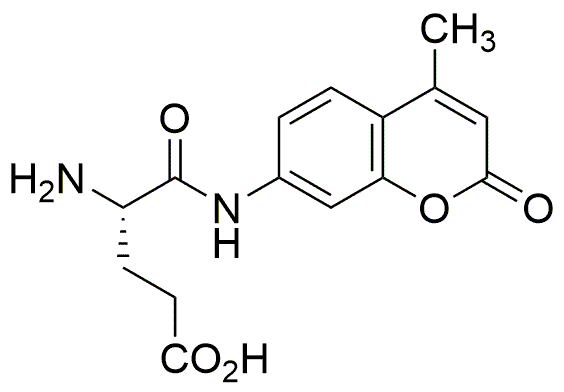H-Glu-AMC is widely utilized in research focused on:
- Biochemical Assays: This compound serves as a substrate in enzyme assays, particularly for proteases, allowing researchers to measure enzyme activity with high specificity and sensitivity.
- Drug Development: H-Glu-AMC is used in the screening of potential drug candidates, especially those targeting proteolytic enzymes, facilitating the discovery of new therapeutic agents.
- Cell Biology: In cell culture studies, this compound helps in understanding cellular processes involving protein degradation and turnover, providing insights into cellular health and disease mechanisms.
- Diagnostics: It plays a role in the development of diagnostic tools for diseases linked to protease activity, aiding in the early detection and monitoring of conditions such as cancer.
- Research on Neurodegenerative Diseases: H-Glu-AMC is valuable in studying the role of proteases in neurodegenerative disorders, contributing to the understanding of disease progression and potential therapeutic targets.
General Information
Properties
Safety and Regulations
Applications
H-Glu-AMC is widely utilized in research focused on:
- Biochemical Assays: This compound serves as a substrate in enzyme assays, particularly for proteases, allowing researchers to measure enzyme activity with high specificity and sensitivity.
- Drug Development: H-Glu-AMC is used in the screening of potential drug candidates, especially those targeting proteolytic enzymes, facilitating the discovery of new therapeutic agents.
- Cell Biology: In cell culture studies, this compound helps in understanding cellular processes involving protein degradation and turnover, providing insights into cellular health and disease mechanisms.
- Diagnostics: It plays a role in the development of diagnostic tools for diseases linked to protease activity, aiding in the early detection and monitoring of conditions such as cancer.
- Research on Neurodegenerative Diseases: H-Glu-AMC is valuable in studying the role of proteases in neurodegenerative disorders, contributing to the understanding of disease progression and potential therapeutic targets.
Documents
Safety Data Sheets (SDS)
The SDS provides comprehensive safety information on handling, storage, and disposal of the product.
Product Specification (PS)
The PS provides a comprehensive breakdown of the product’s properties, including chemical composition, physical state, purity, and storage requirements. It also details acceptable quality ranges and the product's intended applications.
Certificates of Analysis (COA)
Search for Certificates of Analysis (COA) by entering the products Lot Number. Lot and Batch Numbers can be found on a product’s label following the words ‘Lot’ or ‘Batch’.
Número de catálogo
Número de lote/lote
Certificates Of Origin (COO)
This COO confirms the country where the product was manufactured, and also details the materials and components used in it and whether it is derived from natural, synthetic, or other specific sources. This certificate may be required for customs, trade, and regulatory compliance.
Número de catálogo
Número de lote/lote
Safety Data Sheets (SDS)
The SDS provides comprehensive safety information on handling, storage, and disposal of the product.
DownloadProduct Specification (PS)
The PS provides a comprehensive breakdown of the product’s properties, including chemical composition, physical state, purity, and storage requirements. It also details acceptable quality ranges and the product's intended applications.
DownloadCertificates of Analysis (COA)
Search for Certificates of Analysis (COA) by entering the products Lot Number. Lot and Batch Numbers can be found on a product’s label following the words ‘Lot’ or ‘Batch’.
Número de catálogo
Número de lote/lote
Certificates Of Origin (COO)
This COO confirms the country where the product was manufactured, and also details the materials and components used in it and whether it is derived from natural, synthetic, or other specific sources. This certificate may be required for customs, trade, and regulatory compliance.


